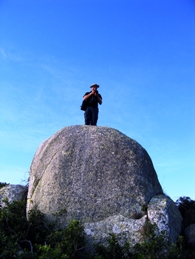Ralph Bergmueller
Domaines de recherche
I am interested in understanding the mechanisms and the evolution of cooperative behaviour in humans and other animals. Moreover, I study the evolutionary causes and consequences of consistent individual differences in behaviour between individuals of the same species, i.e. animal personality.
Animal personality
Behaviours are considered to be among the most flexible traits in animals and often reflect conditional responses upon the behaviours of others, or to changing environmental conditions. However, despite of the often presumed advantages of behavioural flexibility, individuals within the same species or populations often consistently differ in their behaviour, that is, some individuals are consistently more aggressive, more explorative, or shyer than others. I am interested in how this variation in behaviour can result from, or affect social interactions and cooperation.
Human cooperation
Since Hardin's (1968) seminal publication, the 'tragedy of the commons' describes the situation of a cooperation breakdown that occurs when individual and group interests are in conflict (e.g. when individuals use a common resource or a public good). If individuals act selfishly, thereby depleting a resource on which all depend, this leads to the tragedy of the commons. Typical real life examples include land use, over fishing, climate change and peace. I am interested in understanding in how far evolutionary approaches might help to contribute towards improving cooperation to solve public goods problems with help of field experiments in real life settings in humans.

Photo by M. Taborsky:
Group of Neolamprologus pulcher, breeder male defending the
territory against the predator Lepidiolamprologus elongatus
Cooperative breeding
In the cooperatively breeding Lake Tanganyika cichlid Neolamprologus pulcher, I investigated two main decisions of helpers: why they stay in the territory instead of leaving to reproduce on their own, and why they help raising offspring of others. I could show experimentally that ecological constraints, particularly the lack of vacant sites suitable for independent breeding prevent helpers to disperse and breed on their own. Further more I found evidence supporting the 'pay-to-stay hypothesis' which proposes that, in order to be allowed to stay in the dominants territory, subordinates pay a 'rent' by helping the dominants to raise their offspring. Field observations and experiments suggest that helpers may strategically disperse between groups which may lead to a biological market situation were helpers trade for instance their ability to help for access to a high quality territory.
Animal cognition
The differences in cognitive abilities between species might be strongly linked to the challenges animals encounter in their natural and social environment. Cleaner fish (Labroides dimidiatus) rely completely on the food they obtain from the client fish that visit cleaner stations to get cleaned from their parasites. However, besides removing the parasites from their clients tissue cleaners appear to prefer to feed on their clients' mucus which they obtain when biting the client fish. This results in a conflict of interests between cleaners and their clients with regards to goods and services exchanged in interactions. I use a comparative approach to test the cognitive capabilities of different species of wrasses in the context of co-operation from an ecological perspective.
Primate behavioural ecology
In the Tai National Park in Ivory Coast I studied the link between feeding ecology and the social organisation in the terrestrial sooty mangabeys (Cercocebus torquatus atys). The results of this study suggest that mangabeys react to changes in the distribution of food in time and space by adjusting their group size.
CV
| since 2005 | Post-doc with Prof. Bshary, University of Neuchâtel |
| 2004 | Research associate and teaching assistant University of Bern and the University of Neuchâtel |
| 2001-2004 | PhD thesis with Prof. Taborsky, University of Bern |





